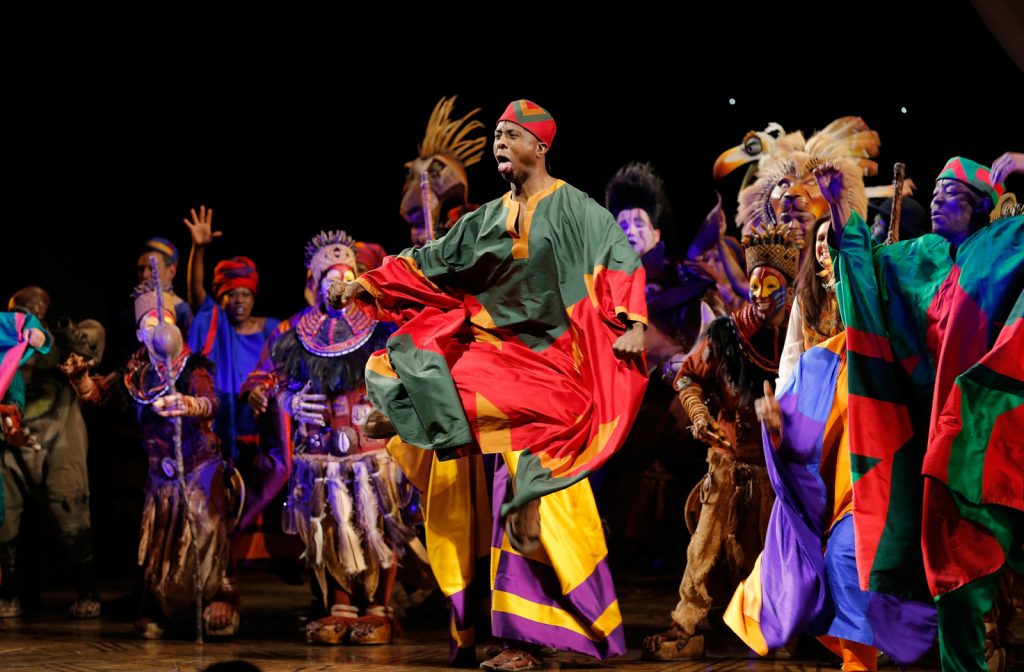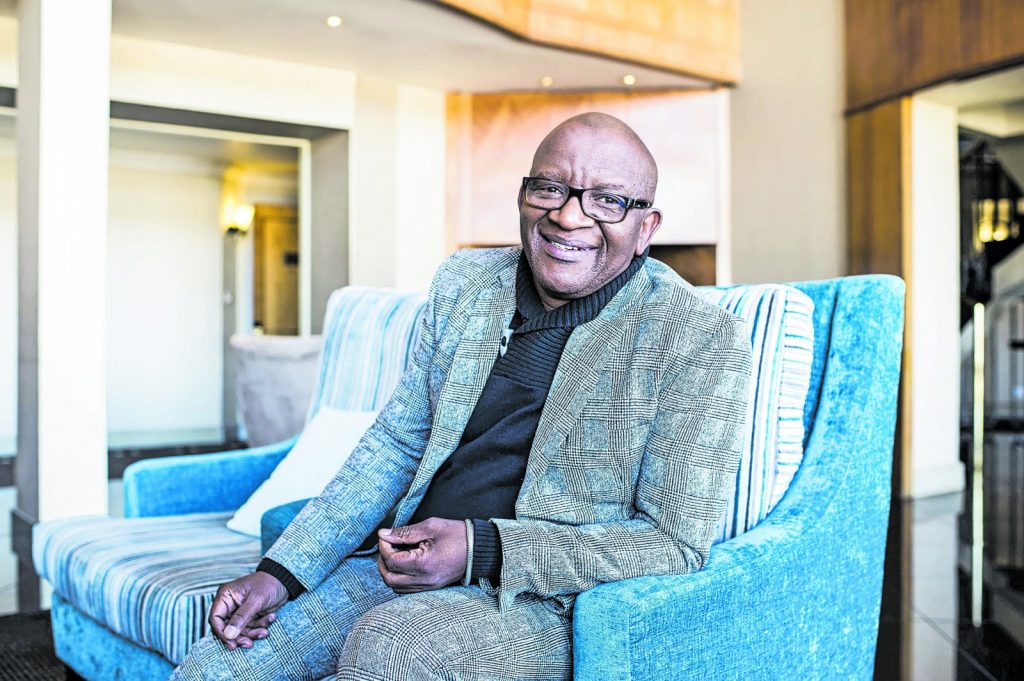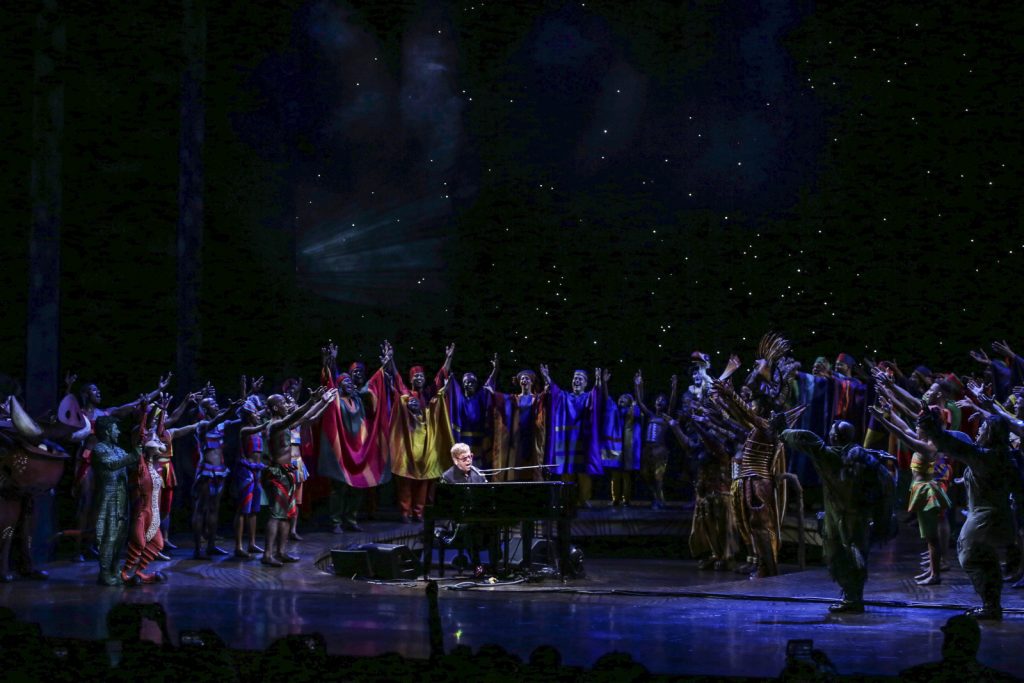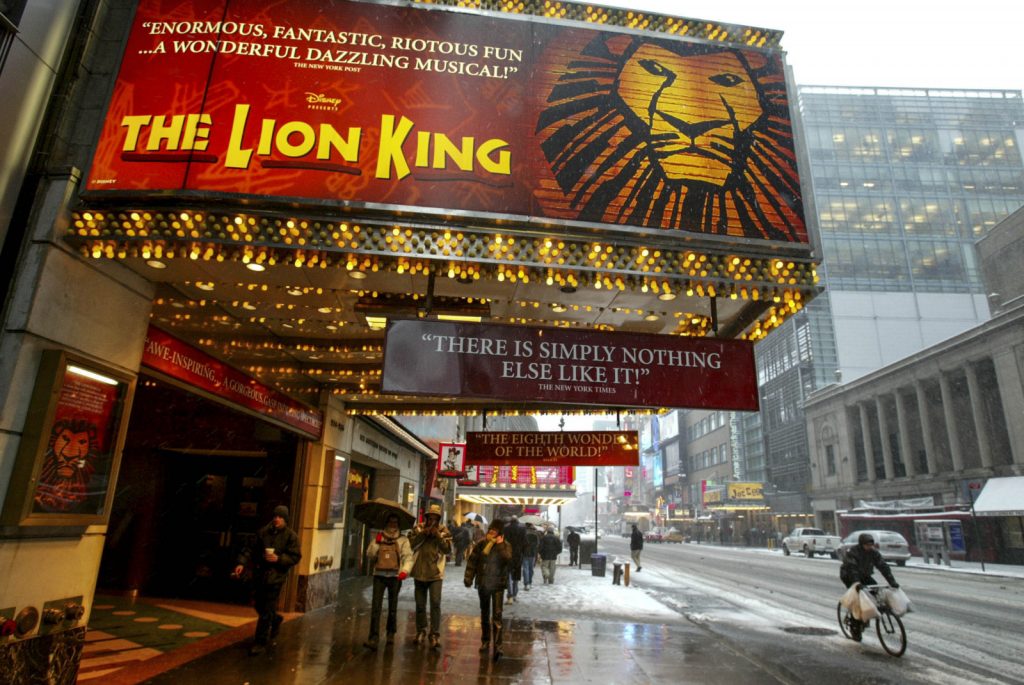The Broadway adaptation of the award-winning movie celebrates its quarter-century. (Photos:
Walter McBride/WireImage/ Delwyn Verasamy
and J Countess/Getty Images)
Whether it’s Can You Feel the Love Tonight by Elton John or Lebo M and Lindiwe Mkhize singing, “Naaants’ ingonyama bakithi baba! (Sithi uhm ingonyama)”, you can’t hear the songs without thinking about Walt Disney’s legendary film The Lion King. The Broadway rendition recently celebrated its 25th anniversary.
For those born in 1997, like myself, our introduction to the film was the animated version. It shaped the way I visually understood storytelling through the music, the animals and their charismatic personalities, half of which at that age I knew nothing about, and the story of triumph after hardship and power entrenched in the film’s storyline.
The animation version tells the story of Simba, voiced by Jonathan Thomas, a cub who is made to feel guilty about the death of his father Mufasa (James Earl Jones), staged by Simba’s uncle Scar (Jeremy Irons).
Simba has to overcome the guilt and grief caused by Mufasa’s death to take on his role as the King of the Pride Lands. As he journeys to take over the throne, we see him battle with issues of identity, family, belonging, rejection and betrayal — which we all face at some point.
This is probably why The Lion King is one of the few animated films that have been able to not only appeal to young audiences but older ones too.
Perhaps one of the more interesting features of the film — that a younger audience member might not appreciate — is its spirituality. Mufasa’s death is about understanding the role of ancestors, how they work together with a higher power to guide you through life.
The film describes how important blood and lineage are in understanding one’s identity. It’s exactly how the film describes it — “the circle of life”. This is perhaps why The Lion King has not only continued to be enjoyed throughout generations but it has been adapted to books and continues to be enjoyed as a stage musical.

The original 1994 film won two Oscars, for best original song and score, and the theatrical adaptation is Broadway’s highest-grossing musical of all time, making roughly $1.6 billion dollars.
The Lion King musical made its debut on 8 July 1997 at the Orpheum Theatre in Minnesota, in the United States, and later that year, premiered on Broadway in New York at the New Amsterdam Theatre.
The growing popularity and positive reception of the film in cinemas laid the foundation for a musical variation that saw Disney executives rope in Julie Taymor, an American theatre writer and director.
Taymor was known for pushing the boundaries in theatre through her use of puppetry in an elaborate, unconventional and exploratory way to bring to life stage characters.
In a recent interview with Broadway World, Taymor shared the challenges of staging the musical over the years and how actors who have been a part of the production for a quarter-century have been able to continuously breathe new life into a story told many times.
“I’ve seen it a couple of times but each time it can be different because it’s live theatre, so this is what’s very thrilling and I learned this when I was a young theatre artist in Indonesia,” she says. “The challenge has been how do you keep things fresh and new and alive because, in traditional theatres in many places, there’s no memorisation.
“I lived in Indonesia for three years and I saw traditional theatre all over Java, Bali and Sumatra and actors in masks with puppets, dancers — they improvise for nine hours. They know their characters.
 Lebo M was involved in creating the sound track for the Lion King. Photo: Delwyn Verasamy
Lebo M was involved in creating the sound track for the Lion King. Photo: Delwyn Verasamy
“But the challenge is that they get together before the performance … and they talk about what story they are going to do that night. While women are threading beautiful frangipani flowers, costumes are being prepared and the audience is eating, drinking, getting excited and flirting and all of that,” explains Taymor.
The avant-garde theatre maker’s approach to creating the musical adaptation of the film proved to be a success as is evidenced by the fact that it has garnered six Tony awards.
What is captivating about the musical is the manner in which the actors become the characters, the vocal gymnastics needed when performing the songs, the embodiment of the puppets and costumes. It’s the boldness of the characters and the colours used on the stage that invite spectators into the Pride Lands.
The musicality of the film is carried through in the theatre production. Although the score was by German composer Hans Zimmer, best known for his work on Pirates of the Caribbean, it was South African composer Lebo Morake, known as Lebo M, whose melodic contribution stood out in the film.
 Elton John with the cast of The Lion King on Broadway in 2017.
Elton John with the cast of The Lion King on Broadway in 2017.
Described by Disney as the “voice and spirit of The Lion King” the Soweto-born composer produced Rhythm of the Pride Lands for Disney. Morake’s legacy will always be attached to the film as he arranged, composed, performed and produced the music for The Lion King; The Lion King II Simba’s Pride, released in 1998, and The Lion King 1½, which debuted in America in 2004.
It is songs like The Lion Sleeps Tonight, featured in both the musical adaptation and the movie, which shows the kind of impact songwriting and composing can have on shaping the manner in which audiences consume films and theatre.
Morake, who was feted at the 25th anniversary of The Lion King on Broadway last month, was later honoured by the South African consul general Motumisi Tawana for his contribution to the award-winning film and production.
“I am grateful for the journey I have been able to go through but there are those who came before me … to whom I dedicate this moment, who walked the streets of America knocked on bigger doors, your Hugh Masekela, Caiphus Semenya, Letta Mbulu, Abdullah Ibrahim.
“I am feeling a little overwhelmed … I never knew I had a responsibility to be continuing a journey that those great giants of our country long walked before I was born,” he says.
He stressed the significance of the film in opening doors for actors in South Africa, such as Lindiwe Dlamini, who was part of the original 1997 Broadway cast.
“It is also pleasing to know that, through this journey, we have changed lives in a very significant way. The financial impact that we have had on South African lives from day one of The Lion King in foreign currency is yet to be realised and understood,” Morake says.
Besides the film and theatre production, there have been various other iterations of The Lion King, including the 2019 Jon Favreau remake with James Earl Jones as Mufasa, actor and musician Donald Glover as Simba and British actor Chiwetel Ejiofor as Scar.

Despite some mixed reviews, The Lion King remains a pivotal moment in the history of animated films and theatre productions. It is one of the few Disney classics that have managed to be successful at the box office and in the theatre.